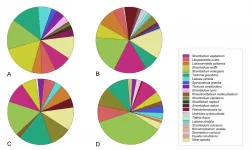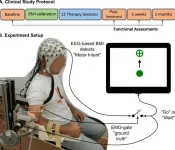Research has shown many college students faced significant mental health challenges going into the COVID-19 pandemic, and experts say the pandemic has added new stressors. The findings, published in the journal PLOS ONE, could help experts tailor services to better support students. The observational study was drawn from a survey of more than 2,100 undergraduate and graduate students in the spring of 2020, when the students at all the universities included in the study had shifted to studying remotely.
"The pandemic is problematic for everyone, and we know that it's especially problematic for students who are eager to experience the unique social atmosphere that college life has to offer," said study co-author Lincoln Larson, associate professor of parks, recreation and tourism management at North Carolina State University. "COVID-19 has thrown a wrench into all of that. Our study found the pandemic is clearly taking a significant psychological toll on students."
In the survey, researchers asked students about the extent to which they felt negative emotions like fear, guilt, irritability, stress and worry when they thought about COVID-19. Researchers also asked open-ended question about how their feelings have changed since the start of the pandemic.
Students most commonly said in the open-ended responses that they felt unmotivated, anxious, stressed and isolated. More than 21 percent of students said they experienced feelings related to lack of motivation: some thought it was difficult to concentrate and others felt unproductive or that they were procrastinating. More than 17 percent said they felt anxious.
When the researchers analyzed students' responses to questions about the extent to which they felt specific emotions, they found 45 percent of students across the seven universities experienced a high risk of psychological impacts. Forty percent of students had a moderate psychological impact risk, and just 14 percent of students were in the low risk category.
The researchers used the data to identify characteristics linked to greater psychological impact from the pandemic. Female students, younger students aged 18 to 24 years, students who had more than eight hours per day of screen time and students who knew someone who contracted COVID-19 were more likely to experience negative psychological impacts from the pandemic, researchers found when they analyzed all of the factors that contributed to mental health risk.
"Our study documents that nearly half of college students were at a severe handicap in terms of their quality of life, education and social relationships because of their mental health during the early stages of the pandemic," said the study's lead author Matthew Browning, an assistant professor at Clemson University. "It also identifies the risk factors that can help colleges and universities target interventions or messaging to encourage these students to come and get help."
The researchers saw that in some cases, students' race or ethnicity and socio-economic status were linked to risk for high psychological impact when those factors were studied independently of others. Specifically, students who identified as Asian were at greater risk, as well as students with fair or poor health.
Spending two or more hours of daily time outdoors was linked to lower mental health impacts before adjusting for other risk factors. Researchers said those potential risk factors need further study.
Overall, they believe the findings could help universities tailor services for students.
"Campus leaders can devise creative interventions to facilitate social interactions and help students adopt more growth-oriented mindsets that turn this unique challenge into an opportunity," Larson said. "While some screen time may be necessary in this era of social distancing, there are still ways for students to connect, get outdoors and be active."
Across the nation, mental health experts have been working to address a growing prevalence of mental health issues among college and university students. A survey of college presidents in the fall of 2020 from the American Council on Education, in partnership with TIAA Institute, found the top two most pressing issues for presidents of four-year institutions were mental health of students and mental health of faculty and staff. On top of existing mental health challenges, the pandemic created new stressors, including increased isolation, said Monica Osburn, executive director of the North Carolina State University Counseling Center.
"Mental health was a significant challenge before COVID, and it absolutely exacerbated what students are feeling," Osburn said. "If you think about it from a developmental perspective, there are many developmental milestones that this group is experiencing loss around."
The NC State Counseling Center is offering virtual counseling appointments for students. For students who don't need counseling but are seeking support, NC State Prevention Services staff are also offering "drop-in" spaces for students to connect to talk about nature, racial and ethnic trauma, expression and the arts. There are also groups for students affected by loss of a loved one, and for coping with COVID-19. NC State Wellness and Recreation also offers online fitness classes and mind-body sessions for students.
"Any good data is helpful data because it gives us areas to target to be able to support students to make change," Osburn said of the study findings. "We want students to know it's OK to ask for help. We want them to reach out to get support. We want them to know: You don't have to go at it alone."
INFORMATION:
The study, "Psychological impacts from COVID-19 among university students: Risk factors across seven states in the United States," was published Jan. 7 online in PLOS ONE. It was authored by Browning, Larson, Iryna Sharaievska, Alessandro Rigolon, Olivia McAnirlin, Lauren Mullenbach, Scott Cloutier, Tue M. Vu, Jennifer Thomsen, Nathan Reigner, Elizabeth Covelli Metcalf, Ashley D'Antonio, Marco Helbich, Gregory N. Bratman and Hector Olvera Alvarez. The authors received no specific funding for the study.
Note to authors: The study abstract follows.
"Psychological impacts from COVID-19 among university students: Risk factors across seven states in the United States"
Authors: Matthew H.E.M. Browning, Lincoln R. Larson, Iryna Sharaievska, Alessandro Rigolon, Olivia McAnirlin, Lauren Mullenbach, Scott Cloutier, Tue M. Vu, Jennifer Thomsen, Nathan Reigner, Elizabeth Covelli Metcalf, Ashley D'Antonio, Marco Helbich, Gregory N. Bratman and Hector Olvera Alvarez.
Published online Jan. 7, 2021.
Abstract: BACKGROUND: University students are increasingly recognized as a vulnerable population, suffering from higher levels of anxiety, depression, substance abuse, and disordered eating compared to the general population. Therefore, when the nature of their educational experience radically changes--such as sheltering in place during the COVID-19 pandemic--the burden on the mental health of this vulnerable population is amplified. The objectives of this study are to 1) identify the array of psychological impacts COVID-19 has on students, 2) develop profiles to characterize students' anticipated levels of psychological impact during the pandemic, and 3) evaluate potential sociodemographic, lifestyle-related, and awareness of people infected with COVID-19 risk factors that could make students more likely to experience these impacts. METHODS: Cross-sectional data were collected through web-based questionnaires from seven U.S. universities. Representative and convenience sampling was used to invite students to complete the questionnaires in mid-March to early-May 2020, when most coronavirus-related sheltering in place orders were in effect. We received 2,534 completed responses, of which 61% were from women, 79% from non-Hispanic Whites, and 20% from graduate students. RESULTS: Exploratory factor analysis on close-ended responses resulted in two latent constructs, which we used to identify profiles of students with latent profile analysis, including high (45% of sample), moderate (40%), and low (14%) levels of psychological impact. Bivariate associations showed students who were women, were non-Hispanic Asian, in fair/poor health, of below-average relative family income, or who knew someone infected with COVID-19 experienced higher levels of psychological impact. Students who were non-Hispanic White, above-average social class, spent at least two hours outside, or less than eight hours on electronic screens were likely to experience lower levels of psychological impact. Multivariate modeling (mixed-effects logistic regression) showed that being a woman, having fair/poor general health status, being 18 to 24 years old, spending 8 or more STUDENT COVID PSYCHOLOGICAL RISK 3 hours on screens daily, and knowing someone infected predicted higher levels of psychological impact when risk factors were considered simultaneously. CONCLUSION: Inadequate efforts to recognize and address college students' mental health challenges, especially during a pandemic, could have long-term consequences on their health and education.




